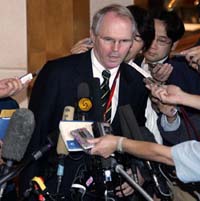US envoy heads on surprise trip to North Korea to jump-start disarmament efforts
A high-ranking U.S. envoy made a rare trip to North Korea on Thursday in a surprise bid to accelerate the international efforts to press the communist government to abandon its nuclear weapons program.

The trip by Assistant U.S. Secretary of State Christopher Hill came ahead of the expected resumption next month of multinational talks on halting the North's nuclear weapons program following the resolution of a key financial dispute that had blocked progress.
North Korea, which carried out its first nuclear test explosion in October, promised in a landmark agreement struck in February with China, Japan, Russia, South Korea and the U.S. that it would shut down its bomb-making nuclear reactor at Yongbyon by mid-April.
Progress was stalled by the financial dispute between Pyongyang and Washington involving alleged North Korean illicit funds. That dispute was resolved in recent days, and although North Korea still hasn't shut the reactor, it invited U.N. monitors next week to discuss a shutdown.
Sending a top U.S. envoy to the North even before it shuts down its reactor displays the Bush administration's eagerness to win progress on the nuclear standoff, seeking a foreign policy triumph amid the deteriorating situation in Iraq.
Hill planned consultations Thursday and Friday on the nuclear issue "to move the process forward," said a U.S. State Department spokesman in Washington, speaking on customary condition of anonymity.
China's state-run news agency Xinhua reported later Thursday that Hill had arrived in the North Korean capital.
Visits to the North by high-ranking U.S. officials are extremely rare. Hill's unexpected trip was the first since one by his predecessor as assistant secretary in October 2002.
The highest-ranking U.S. official ever to visit North Korea was former Secretary of State Madeleine Albright, who met the North's leader Kim Jong Il in late 2000.
Efforts to persuade the North to abandon its nuclear program began in August of 2003, under the so-called six-party talks framework of meetings in the Chinese capital of Beijing.
Hill was to meet with North Korean Vice Foreign Minister Kim Kye Gwan, his counterpart in the six-party forum, to discuss advancing the six-party process, the State Department said. Hill was to return to South Korea on Friday and then travel on to Japan on Saturday.
Hill's trip followed the resolution this week of the banking dispute as well as announcement that U.N. nuclear monitors would visit the communist nation next week.
Inspectors from the U.N. nuclear watchdog, the International Atomic Energy Agency, have been invited by North Korea to visit next week to discuss shutting down the Yongbyon reactor.
Under the February deal, North Korea had pledged to shut down its Yongbyon reactor, its main nuclear processing facility, by the middle of April in exchange for energy and economic aid.
However, Pyongyang refused to dismantle any of its nuclear facilities until about US$25 million (euro18.62 million) in North Korean funds were freed from frozen accounts at Macau's Banco Delta Asia, and missed the April deadline. No new deadline has been set.
The U.S. only recently endorsed the release of funds to help end the standoff, and Hill said Tuesday that the money had finally deposited in a North Korean bank account and that the case was closed.
North Korea is to eventually receive further aid equivalent to 950,000 tons of heavy fuel oil in return for irreversibly disabling the reactor and declaring all of its nuclear programs.
Subscribe to Pravda.Ru Telegram channel, Facebook, RSS!


